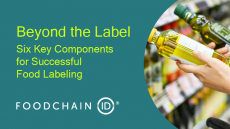FDA should improve GRAS oversight, says GAO
The Food and Drug Administration (FDA) no longer ‘approves’ food ingredients as GRAS, but does review their safety if a company submits a research dossier including the findings of an independent scientific panel. Following review, the FDA can issue a letter of no objection, leading to what is commonly referred to as FDA GRAS. However, the company remains responsible for ensuring the ingredient is safe and that it complies with all regulatory requirements.
Alternatively, a company can self-affirm GRAS after conducting all necessary research and forming an independent panel to determine its safety. To self-affirm, the company needs to be confident that it could defend the safety of its ingredient based on this process.
No ‘systematic’ checks since 1980s
But the GAO said the FDA should be made more aware of self-affirmed GRAS products, and should systematically review the safety of current GRAS ingredients as new scientific data comes to light.
“FDA is not systematically ensuring the continued safety of current GRAS substances,” the report said. “While, according to FDA regulations, the GRAS status of a substance must be reconsidered as new scientific information emerges, the agency has not systematically reconsidered GRAS substances since the 1980s.”
FDA officials countered they are continuously reviewing the scientific literature and take action on particular substances if information is brought to their attention that causes them to doubt an ingredient’s safety.
Citizen Petitions
Specifically, the GAO pointed to citizens’ petitions about certain GRAS ingredients, such as salt and trans fats, saying the agency has “largely not responded” to these concerns.
“In addition, FDA does not know to what extent, or even whether, companies track evolving scientific information about their GRAS substances,” the GAO added.
The FDA responded: “FDA considers Citizen Petitions an important component of post-market review when scientifically sound safety issues are raised and appropriately documented with scientific data and information. Unfortunately, this is not always the case. An effective FDA strategy would need to include a means of triaging Citizen Petitions for their scientific and legal merit if limited FDA resources are to be spent wisely.”
Nanotechnology
The FDA has previously stated that in terms of safety assessment, it would not view products that contain nanotech materials any differently from others, in that regardless of the technology used to make them, companies are responsible for ensuring the safety of all ingredients. This policy differs from those in place in Canada and Europe, where all food ingredients incorporating nanotechnology must be submitted to regulators before they can be marketed.
Responding to the GAO’s recommendations for nanotech ingredients, including that companies should be required to inform the FDA if any of their self-affirmed GRAS products involve nanotechnology, the FDA said it intends to develop guidance to help food makers understand how the GRAS process applies.
The agency added: “While a single definition for nanomaterials for all FDA-regulated products may have a certain utility, the key issue for safety evaluation is not whether a bright line on the nano-scale has been crossed but whether the modification at the nano-scale creates new properties that require testing to ensure safety under intended conditions of use.”
The full GAO report is available online here.

















